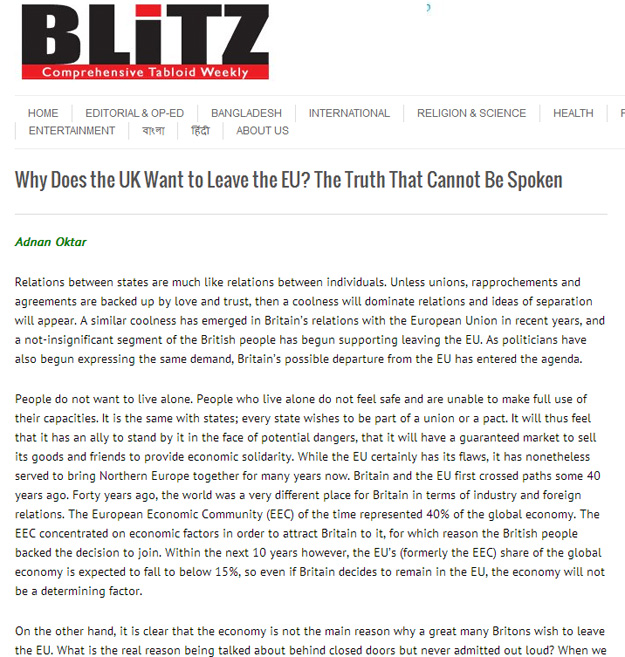Bigotry: The Dark Danger
Why Does the UK Want to Leave the EU? The Truth That Cannot Be Spoken

Relations between states are much like relations between individuals. Unless unions, rapprochements and agreements are backed up by love and trust, then a coolness will dominate relations and ideas of separation will appear. A similar coolness has emerged in Britain’s relations with the European Union in recent years, and a not-insignificant segment of the British people have begun supporting leaving the EU. As politicians have also began expressing the same demand, Britain’s possible departure from the EU has entered the agenda.
People do not want to live alone. People who live alone do not feel safe and are unable to make full use of their capacities. It is the same with states; every state wishes to be part of a union or a pact. It will thus feel that it has an ally to stand by it in the face of potential dangers, that it will have a guaranteed market to sell its goods and friends to provide economic solidarity. While the EU certainly has its flaws, it has nonetheless served to bring Northern Europe together for many years now. Britain and the EU first crossed paths some 40 years ago. Forty years ago, the world was a very different place for Britain in terms of industry and foreign relations. The European Economic Community (EEC) of the time represented 40% of the global economy. The EEC concentrated on economic factors in order to attract Britain to it, for which reason the British people backed the decision to join. Within the next 10 years however, the EU’s (formerly the EEC) share of the global economy is expected to fall to below 15%, so even if Britain decides to remain in the EU, the economy will not be a determining factor.
On the other hand, it is clear that the economy is not the main reason why a great many Britons wish to leave the EU. What is the real reason being talked about behind closed doors but never admitted out loud? When we look at Britain’s disagreements with the EU, although the economy is publicly cited as the cause, the source of unease is cultural. The debates almost always revolves around immigration policies. Great Britain has a deep-rooted history and is one of the leading cultures instrumental in bringing civilization not only to the continent of Europe, but to a fair-sized part of the world. While there is much to be criticized in British culture, there is also much we should take on board. The British and the Turks have engaged in cultural exchanges for various reasons for hundreds of years. Today, if it is Italy that comes to mind for the Turkish people when clothing and fashion are mentioned, Britain comes to mind when concepts such as high-quality textiles, table manners and gardening crop up. Numerous intellectual movements that have influenced the entire world, including the Magna Carta, the European foundation for today’s democratic constitutions, originated in Britain.
It is a well-known and regrettable fact that migrants in Britain are frequently subjected to racist attacks. Propaganda from many political parties great and small revolve around racist policies. Racism of all kinds must be shunned, and racist policies must be opposed right down the line; nobody must be excluded, despised, oppressed or treated as a second-class citizen because of the color of his skin, ethnicity, religion or for any other reason. That is fundamentally immoral, and is prohibited in all religions. However, the desire to protect one’s own culture must not immediately be interpreted as racism. Britain’s opposition to the EU’s policies on immigration does not stem from a desire to share the island only with people who share British genes; of course there are people who hold such bigoted views and wish to exclude immigrants as a result of racist tendencies. But it should be noted that there is also a popular desire among people to maintain high quality and lofty standards of civilization in their countries. However, the solution is not to close the door to immigrants, but to make a serious investment in educating immigrants and to encourage civil society organizations along those lines.
A lowering of the quality of life is a threat for the whole world. The Islamic world faces the same problem. Every country has a primary responsibility to maintain civilization and the quality thereof. If there are people who desire a lifestyle that seeks to damage the quality of civilization and harm green areas, one far removed from what is required for a civilized life, then it makes no difference whether they are immigrants or natives. The state has a responsibility to find a solution by adopting cultural measures, legal precautions, sanctions and comprehensive education policies.
The EU is important as a umbrella bringing European culture together. Institutionally, it makes an important contribution by fostering democratic standards on its member countries. However, the EU has lost its spiritual fervor, as well as its influence on cultural matters. Britain’s departure from the union may encourage others to leave and result in the EU falling apart. Therefore, if it agrees to Britain taking steps intended to protect its own culture while still protecting the rights of migrants, the ensuing rise in quality may spread to other countries, and there will be a positive trend in the continent as a whole. I must remind readers that what the EU needs most is spiritual regeneration above all, but it should not seek to be an exclusionary or discriminatory regeneration; it must seek to address peoples of all faiths and must endeavor to make them feel they too have a stake in European culture and that regardless of differences, that all will be treated with respect, tolerance and a spirit of brotherhood.
Adnan Oktar's piece on Weekly Blitz:
http://www.weeklyblitz.net/2014/06/uk-want-leave-eu-truth-spoken/
2014-06-14 00:41:34
_05.jpg)
_11.jpg)
_12.jpg)



